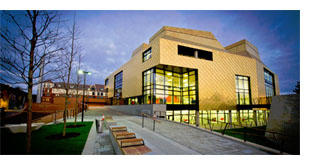A compassionate university
The University of Worcester is the first UK university to sign the Charter for Compassion.

Founded as a teacher training college in 1946, the University of Worcester has, from its foundation, had a strong commitment to utilising the power of education for the major benefits both to individuals and society as a whole. That commitment endures to this day, and we are proud that our graduates are able to work with compassion that stems from confidence in their own competence.
It is our mission to motivate and empower our students, graduates and staff to make a first rate contribution to society.
Students who make a difference

Worcester courses promote ethical and responsible behaviour, encouraging an understanding of the values of sustainability, inclusion and mutual respect.
Many of our courses equip graduates to make a direct contribution towards the wellbeing and development of others.
We are one of the best, as well as one of the largest, providers of teacher education in the UK, with a longstanding outstanding reputation for initial teacher training, continuing professional development and for educating people to work with children and young people. Over 500 schools work in partnership with the University, and our graduates work in thousands of schools and colleges all over Britain.
We offer a wide range of degree courses which lead to professional registration in health, including nursing, midwifery, para-medicine, occupational therapy and physiotherapy. All are highly rated by the Nursing and Midwifery Council and other relevant professional bodies and benefit from our strong network of partnerships with Hospital, Health Trusts and other organisations.
Our constantly reinvigorated strategy for purposeful partnerships with education, business, arts, sports, cultural and public service organisations means that our students and graduates have the opportunity to be involved in the University’s work as a key engine for opportunity, creativity, wealth creation and improved public services for our region and beyond.
Real-world research
Research work at the University includes a high proportion of work with significant beneficial impact for individuals and for society.
The National Pollen and Aerobiology Research Unit, housed in state-of-the-art laboratory facilities at our St John’s Campus, has done invaluable work to improve public health and inform national forecasting policy for many years.
Our Association for Dementia Studies is nationally renowned for the training and research that it undertakes to improve the care of people with dementia and related conditions. The newly formed Centre for Palliative Care, a joint initiative with St Richard’s Hospice, aims to further improve care and support for the terminally ill and their families.
We aim to make a truly transformative contribution to the lives of our students, our staff and the people of our region and to make a very positive impact in society more broadly.
University of Worcester Strategic Plan (2013-18)
An informed and engaged workforce
A higher than average proportion of our graduates progress to employment in the region, and contribute across a broad range of sectors, in health and education, sport and culture, business and voluntary organisations. Through our work placement schemes and Earn As You Learn programme, many local businesses are able to benefit from the knowledge and skills of our students even before they graduate.

An inclusive culture
The University of Worcester aims to stand out as a visionary, highly inclusive university that challenges and overcomes barriers to participation in higher education. Key to this aim is our policy of selecting and admitting students on the basis of their ability to succeed, irrespective of their background.
Through our outreach work, including working in schools and inviting pupils to dedicated events on campus, we aim to raise aspirations and attainment amongst people with great potential who have not previously considered the opportunities created by a higher education.
A positive impact on society
All universities have a duty to deliver public benefit and to make a positive impact on society. We aim to be an exemplar of how an institution of higher education can organise its activities to deliver outstanding public benefit, and to maximise opportunities to impact positively on its community, and society generally.
Apart from the extensive benefits that our students, graduates and staff bring, the University has created transformational and inclusive facilities for students and the community.

The Hive, Europe’s first joint university and public library, is symbolic of this inclusive commitment to opportunity. The Hive includes an inspirational children’s library that encourages younger minds to develop a love of learning. There is also an extensive local heritage archive, and community information hub, in addition to the sizeable lending library. Library membership within the region soared by 500% in the first year that The Hive was open.
The University of Worcester Arena, a 2,000 seat indoor sports venue is the first in Britain to be specifically designed to meet the needs of wheelchair athletes. Opened in 2013 it has already become the home for Great Britain’s men's and women's wheelchair basketball teams, and an exciting new sports and cultural venue with a host of regional, national and international events including many for children.
A proud tradition
Originally founded to win the peace through education, the modern University of Worcester has a proud tradition of inclusion and transformative social impact. This emphasis is present in the development of our new facilities, in the execution of our policies, and most significantly of all, in the actions and attitudes of our staff, students and graduates, both in their academic work and in the many and varied voluntary and additional duties they take up across our region.